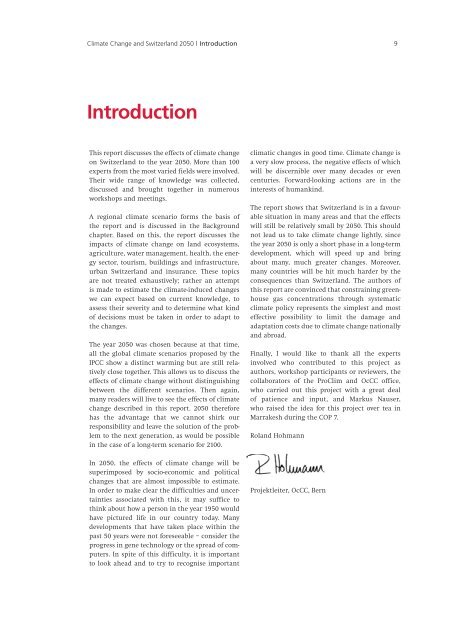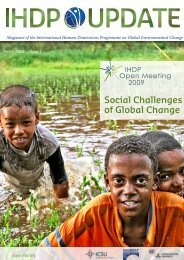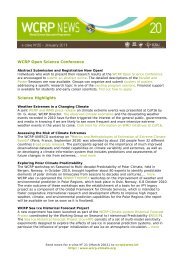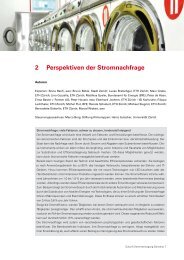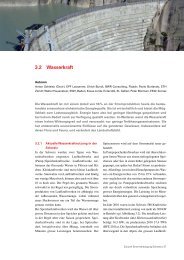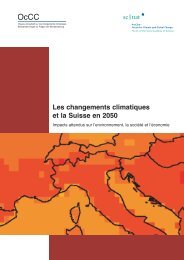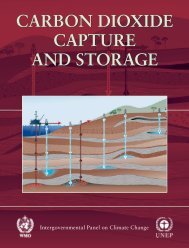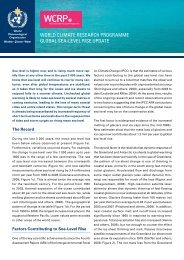Climate Change and Switzerland 2050 - OcCC - SCNAT
Climate Change and Switzerland 2050 - OcCC - SCNAT
Climate Change and Switzerland 2050 - OcCC - SCNAT
Create successful ePaper yourself
Turn your PDF publications into a flip-book with our unique Google optimized e-Paper software.
<strong>Climate</strong> <strong>Change</strong> <strong>and</strong> Switzerl<strong>and</strong> <strong>2050</strong> | Introduction 9<br />
Introduction<br />
This report discusses the effects of climate change<br />
on Switzerl<strong>and</strong> to the year <strong>2050</strong>. More than 100<br />
experts from the most varied fields were involved.<br />
Their wide range of knowledge was collected,<br />
discussed <strong>and</strong> brought together in numerous<br />
workshops <strong>and</strong> meetings.<br />
A regional climate scenario forms the basis of<br />
the report <strong>and</strong> is discussed in the Background<br />
chapter. Based on this, the report discusses the<br />
impacts of climate change on l<strong>and</strong> ecosystems,<br />
agriculture, water management, health, the energy<br />
sector, tourism, buildings <strong>and</strong> infrastructure,<br />
urban Switzerl<strong>and</strong> <strong>and</strong> insurance. These topics<br />
are not treated exhaustively; rather an attempt<br />
is made to estimate the climate-induced changes<br />
we can expect based on current knowledge, to<br />
assess their severity <strong>and</strong> to determine what kind<br />
of decisions must be taken in order to adapt to<br />
the changes.<br />
The year <strong>2050</strong> was chosen because at that time,<br />
all the global climate scenarios proposed by the<br />
IPCC show a distinct warming but are still relatively<br />
close together. This allows us to discuss the<br />
effects of climate change without distinguishing<br />
between the different scenarios. Then again,<br />
many readers will live to see the effects of climate<br />
change described in this report. <strong>2050</strong> therefore<br />
has the advantage that we cannot shirk our<br />
responsibility <strong>and</strong> leave the solution of the problem<br />
to the next generation, as would be possible<br />
in the case of a long-term scenario for 2100.<br />
In <strong>2050</strong>, the effects of climate change will be<br />
superimposed by socio-economic <strong>and</strong> political<br />
changes that are almost impossible to estimate.<br />
In order to make clear the difficulties <strong>and</strong> uncertainties<br />
associated with this, it may suffice to<br />
think about how a person in the year 1950 would<br />
have pictured life in our country today. Many<br />
developments that have taken place within the<br />
past 50 years were not foreseeable – consider the<br />
progress in gene technology or the spread of computers.<br />
In spite of this difficulty, it is important<br />
to look ahead <strong>and</strong> to try to recognise important<br />
climatic changes in good time. <strong>Climate</strong> change is<br />
a very slow process, the negative effects of which<br />
will be discernible over many decades or even<br />
centuries. Forward-looking actions are in the<br />
interests of humankind.<br />
The report shows that Switzerl<strong>and</strong> is in a favourable<br />
situation in many areas <strong>and</strong> that the effects<br />
will still be relatively small by <strong>2050</strong>. This should<br />
not lead us to take climate change lightly, since<br />
the year <strong>2050</strong> is only a short phase in a long-term<br />
development, which will speed up <strong>and</strong> bring<br />
about many, much greater changes. Moreover,<br />
many countries will be hit much harder by the<br />
consequences than Switzerl<strong>and</strong>. The authors of<br />
this report are convinced that constraining greenhouse<br />
gas concentrations through systematic<br />
climate policy represents the simplest <strong>and</strong> most<br />
effective possibility to limit the damage <strong>and</strong><br />
adaptation costs due to climate change nationally<br />
<strong>and</strong> abroad.<br />
Finally, I would like to thank all the experts<br />
involved who contributed to this project as<br />
authors, workshop participants or reviewers, the<br />
collaborators of the ProClim <strong>and</strong> <strong>OcCC</strong> office,<br />
who carried out this project with a great deal<br />
of patience <strong>and</strong> input, <strong>and</strong> Markus Nauser,<br />
who raised the idea for this project over tea in<br />
Marrakesh during the COP 7.<br />
Rol<strong>and</strong> Hohmann<br />
Projektleiter, <strong>OcCC</strong>, Bern


